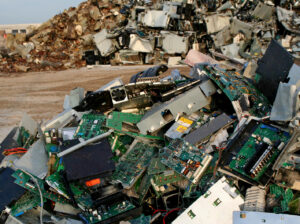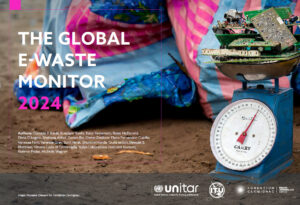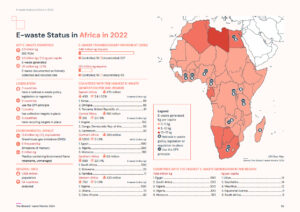2024-03-22: The United Nation’s 4th Global e-Waste Monitor (#GEM) Report has revealed that the world’s generation of Electronic Waste is rising five times faster than documented e-Waste Recycling.
The 62 Million Tonnes of e-Waste generated in 2022 would fill 1.55 million 40-tonne trucks, roughly enough trucks to form a bumper-to-bumper chain encircling the equator.
.

.
Less than one quarter (22.3%) of the year’s e-Waste Mass was documented as having been properly collected and recycled in 2022, leaving over Euro €57 Billion worth of recoverable natural resources unaccounted for, and increasing pollution risks to local communities. Worldwide, the annual generation of e-Waste is rising by 2.6 Million Tonnes annually, on track to reach 82 Million Tonnes by 2030, a further 33% increase from the 2022 figure.
E-waste, any discarded product with a plug or battery, is a health and environmental hazard, containing toxic additives or hazardous substances such as mercury, which can damage the human brain and co-ordination system.
.

2024 UNITAR / ITU Global e-Waste Monitor (GEM) Report
[ Download PDF File, 15.06 MB ]
The Report foresees a drop in the documented collection and recycling rate from 22.3% in 2022 to 20% by 2030 due to the widening difference in recycling efforts relative to the staggering growth of e-Waste generation worldwide. Challenges contributing to the widening gap include technological progress, higher consumption, limited repair options, shorter product life cycles, society’s growing ‘smartness’, design shortcomings, and inadequate e-Waste management infrastructure.
The Report also notes that the world ‘remains stunningly dependent’ on a few countries for rare earth elements, despite their unique properties crucial for future technologies, including renewable energy generation and e-Mobility.
.

.
31 Million Tonnes … Estimated weight of metals embedded in e-Waste in 2022, along with 17 Million Tonnes of plastics and 14 Million Tonnes of other materials (minerals, glass, composite materials, etc.)
17.6 Kg … Per Capita e-Waste generation in Europe, followed by Oceania (16.1 kg) and the Americas (14.1 kg)
5.1 Million Tonnes (8.2% of Global Total) … e-Waste shipped across borders in 2022, of which approximately 3.3 Million Tonnes (65%) was shipped from high-income to middle/low-income countries through uncontrolled, undocumented movements
NOTE: Cross national border ‘exporting’ of e-Waste – ANY Waste – Is NOT Recycling !
33% (20.4 Million Tonnes) … Proportion of e-waste made up of small devices (e.g. toys, microwave ovens, vacuum cleaners, e-cigarettes), of which 12% are recycled
.
.
END
#UN #UNITAR #ITU #eWaste #WEEE #PVpanels #SmartSociety #IoT #AI #SmartPhones #SmartTV #Recycling #RenewableEnergy #e-Mobility #EV #ElectricVehicles #Landfill #LithiumIonBatteries #ScarceNaturalResources #RareEarthMetals #HealthHazard #ClimateDisruption #Cobalt #HumanRights #EnvironmentalHarm #VirtualEnvironment #MilitaryEwaste #SpaceEwaste #Africa #Sustainability #SustainabilityImpactAssessment
Sustainability Impact Assessment (#SIA): A continual evaluation and optimization process – informing initial decision-making, design, shaping activity / product / service realization, useful life, and termination or final disposal – of the interrelated positive and negative social, environmental, economic, institutional, political and legal impacts on balanced and equitable implementation of Sustainable Human & Social Development.
.
